ASA Alumni Interviews: Emilee Latimer - Buenos Aires
-Oct-24-2024-12-18-03-6656-PM.png?width=600&height=600&name=Copy+of+ASA-Instagram+Template+(93)-Oct-24-2024-12-18-03-6656-PM.png)
Photo: Emilee on an ASA day trip to tour Tigre
Meet Emilee Latimer, an ASA alumna from the University of Delaware (class of 2021, masters class of 2022) who studied abroad with us in Buenos Aires, Argentina in 2019. Before that, she also studied abroad through her university in Madrid, where she now lives and works with her Argentine partner Benja who she met during her study abroad adventures.
Below, Emilee shares some of the memories of her time in Buenos Aires, a few things she loves about living in Madrid, her top tips for culture shock and homesickness, and what—as an expat—the concept of “home” now means to her.
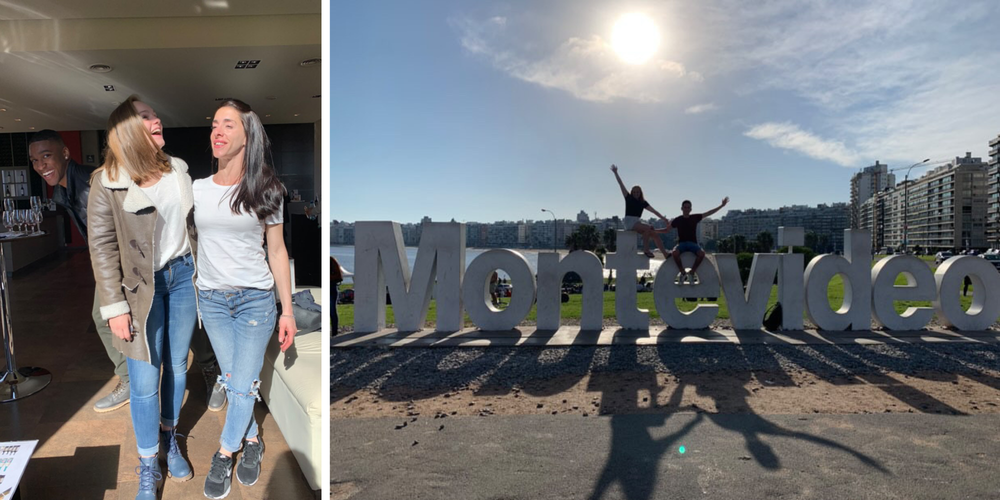
Photos: Shawn (another students) photobombing a picture of Emilee and ASA Programs Advisor Gabi Gamper on an ASA trip to Mendoza; Benja and Emilee on a trip to Uruguay
ASA: Share three quick fun facts about yourself!
EMILEE LATIMER: I am an American expat living permanently in Madrid, Spain, for the past two years. I am 25 years old. I love to play fútbol (soccer) with my friends.
ASA: You studied abroad with ASA in Buenos Aires in 2019. Why did you choose Buenos Aires? Was it the right decision for you and why?
EL: I chose Buenos Aires because I had an amazing academic advisor at my uni who was in love with the city. It was one of the only full semester programs in South America that my uni collaborated with at the time in the fall of 2019. Thank goodness she encouraged me to go! Not only did it change my life for many reasons, but I met my partner of five years!
ASA: Was there anything that surprised you about Argentina that would be useful for incoming study abroad students to know?
EL: I will always recall the first drive from the Ezeiza airport to Belgrano. My first thought was, “What did I get myself into?”. Now at the time, I was so nervous about being in South America simply because of the stereotypes we are fed since we are young. Which cannot paint the picture more wrong, so don’t let preconceptions of a place keep you from going! Buenos Aires is an amazing and beautiful city with some of the best people I have ever had the pleasure of meeting.
One thing that always surprises me is that it’s one of the best places to take a bike and just see the city. There are bike lanes in almost every road and there’s a function in Google where you can filter for the bike lanes in your route. Every time I return to BA, I always have one day to go biking. It really is the best way to see the whole city. But always wear sunscreen…no joke.
I think one other thing of note about BA is the friendliness of the people. Everyone is so kind and open and wants to talk with you. They love their Yankees! Also, don’t refer to yourself as “American” unless you want a lecture about how we are all American!
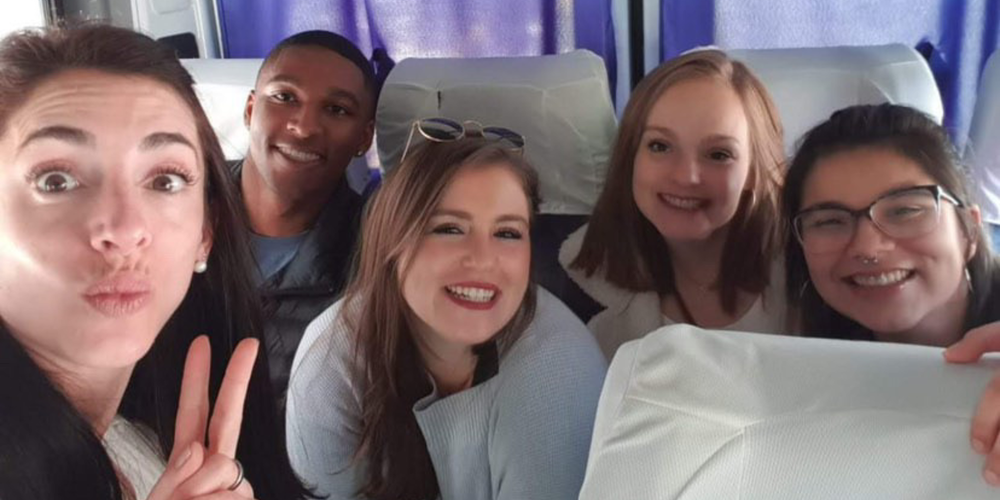
Photo: ASA Programs Advisor Gaby Gamper with students on a bus tour in Mendoza
ASA: Tell us about your accommodation and host family in Buenos Aires. What did this setup teach you about the culture that you may not have learned otherwise?
EL: This was my first experience with a host family. I stayed with an older lady whose children had already moved away. When we arrived, she had her son visiting from LA and we got to meet him and spend some time getting to know the mom as well as her son. This, at first, helped because he spoke fluent English, so if we weren’t understanding, he could help. I think it made me really understand the older generation as well. Obviously, we meet younger generations while studying and meeting new people through various exchanges. But, understanding the older generations puts a different perspective on the city and the life there. The older generations of BA are quite interesting to learn from because they have experienced so much of the countri’s history - good and bad - and I did learn quite a bit from my host mom. I do see her every time I return to the city! I definitely got another family out of my trip to BA!
ASA: How did the academics in Buenos Aires compare to what you were used to back home?
EL: I loved the academics at Universidad de Belgrano! My classes were taught in English, but I was offered to take certification courses to study Latin American business and economics! Within this program, I studied social economics, Latin economics, economy in the southern cone (Chile, Argentina, Uruguay) and a few more. These classes taught us everything that had to do with the past history and current. To this day I feel like I know more than some Argentinos do about their economic history. Generally, I felt the courses were easier in terms of required homework, but still challenging in thoughts and conversations in class. I felt as though I learned so much from the classes and the professors were so kind and funny!
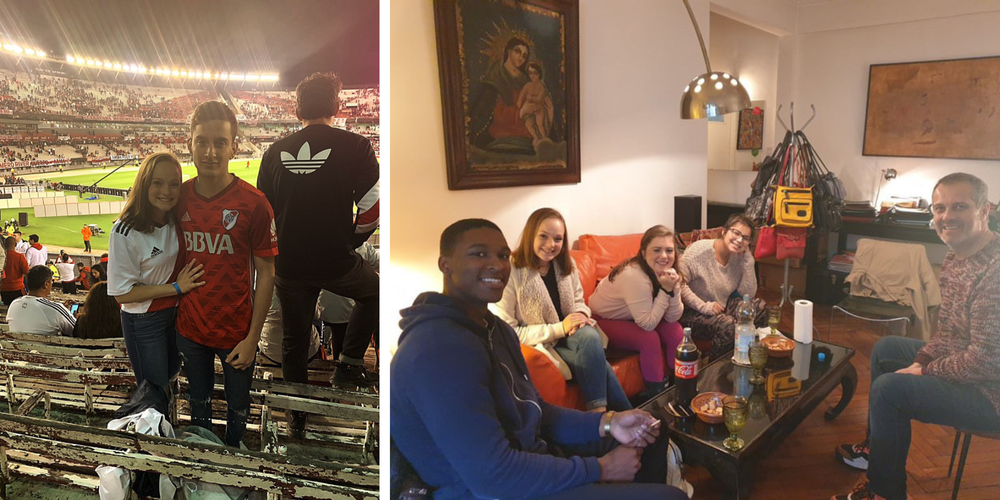
Photos: Emilee with her partner Benja at a River Plate game - her first Latino fútbol game; A day activity with ASA Programs Advisor Gabi Gamper and other students. They went to see a local craftsperson who handcrafts leather products. Emilee bought a bag and wallet for her grandfather and found the price super reasonable.
ASA: Did you meet anyone while studying abroad that had an impact on your life in some way?
EL: In short, yes. I met my loving and amazing partner who I now live with in Madrid! Outside of that, I met him while we were both in larger friend groups. So our groups mixed and we did many things together like merienda after classes and group outings at our favorite bar (always the same one)! To this day, I consider many of “his friends” my friends as well. When we go back, we always catch up with them if they are in the city! Additionally, the ASA program director while I was there was amazing! She was so much fun. I still see her when I am back in BA!
ASA: You got to travel a bit when you were in South America. Where did you go? Share one highlight from each trip!
EL: Mendoza (ASA trip): The wine & olive oil tour we did was incredible! I didn’t know there were so many types of olive oil and I got to bring some back for my family that we still gradually use!
Tigre (ASA trip): We went on an ASA day trip to tour Tigre where we did a boat tour. It was a perfect day!
Iguazu (trip with Argentina For All, a student-led group in BA): if you think Niagara Falls is pretty, you’re in for a surprise, because Iguazu is probably one of the most beautiful wonders I have ever seen. I didn’t want to stop looking.
Montevideo, Uruguay (individual trip with my partner): The food and wine are amazing! The street art really surprised me as well. They have a rambla that is beautiful during sunsets too!
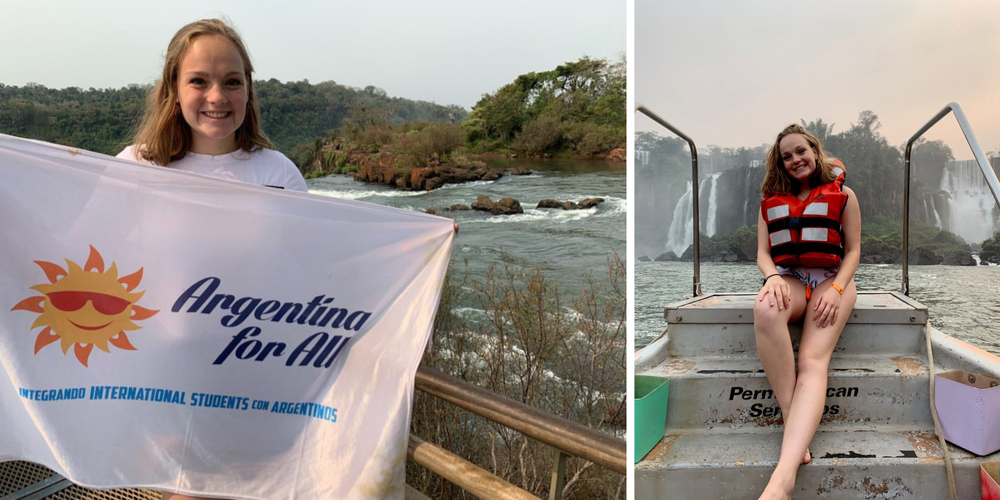
ASA: Now you’re living in Madrid, another ASA city! What are five things you love about life in Madrid?
EL: Ahh Madrid al cielo. I am so happy I get to call Madrid home. Five things I love:
(1) the tapas culture. Everyone is out at tapas bars all day every day. 10 am on your way to work - small local bars and cafes are full and even people drinking beers at that hour surprises me to this day. My favorite though is walking in the evening and all the bars and restaurants are full of people socializing and laidback.
(2) The architecture. It is stunning. I walk around with my head in the clouds half the time gawking at the buildings. Madrid is so clean as well so it really adds to the atmosphere.
(3) Fall & spring weekends in Retiro. When the weather isn’t 90-100F (30-40 Celsius), everyone goes out to the parks. Retiro is so fun to go with your friends and have a picada and some tinto de verano! Additionally, Madrid has so many groups to join whether you like to run, work out, join a girls’ group, or play fútbol. There really is something for everyone!
(4) The environment with meals. It is really common for everything to stop during these times. In my office, from 3-4 no one is in the office space. Everyone goes to the kitchen and eats together. If you are in the office space, beware people will ask you to come have lunch and a break. This not only happens to me now at the office but also with the residence hall I lived in and in uni.
(5) Lastly, the location of Madrid with the rest of Spain. It’s so easy to get anywhere from here. The beach - one Renfe and two hours, you’re there and it’s not expensive. To the north, south, or east. And Portugal is an hour and a half and €20 flight. London - 3 hours and €100-150 euro flight and you’re there!
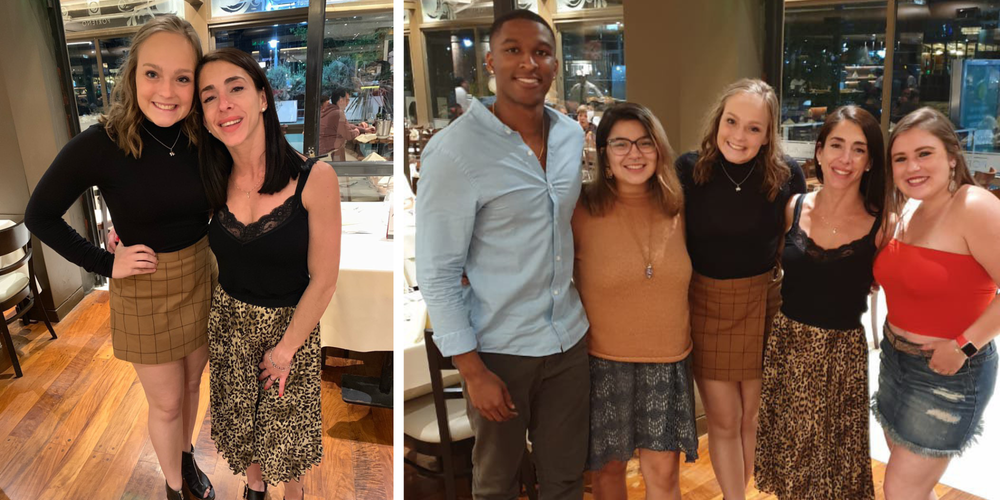
ASA: As someone who has lived abroad multiple times and traveled extensively, have you dealt with homesickness, culture shock, reverse culture shock, etc? Do you have any related mental health tips for student travelers?
EL: Yes, of course. I think no matter where or how long you go away, you experience a level of all of this. In the end, life is life and no matter where you go it catches up with you.
For me, my family is super good with FaceTime. I talk to my mom, grandparents, sisters, friends, and uncle all the time. I probably FaceTime them for an hour each at least once a week. That really helps. The first time I went abroad, my family gave me a stack of cards and on the envelope wrote, “for when you feel sad”, “for when you’re missing home” etc. And my sisters, mom and grandparents all wrote in them words of encouragement that went along with the “theme” of the card. Those really helped me. To see their handwriting, something tangible that was with them at some point in time. I still have all of them to this day and when I’m feeling down I will still look at them. It’s been 7 years now. Starting in a new place is always going to be difficult. I am watching my partner go through the same things I went through the very first time I went abroad.
But, know you’re not the first to feel like this and you’re not the last. The most important thing to do is put yourself out there. What you put your energy into is where you get your energy back out. So, if you are constantly on your phone or prioritizing what you “have” at home, you won’t get out of the experience what some others will. I did this on my first experience abroad and highly regretted it.
Tips: talk with your family and friends regularly. Do language exchanges; they kinda suck at first, but it’s the best way to meet people and improve your communication skills. Get up and go for a walk if you have late classes. Join a gym! I did this in BA and had the best time with the gym staff and it made me want to go to the gym!
ASA: Having lived in the US, Argentina, and Spain, how do you define “home”? Has this definition changed for you since you first moved abroad?
EL: People ask me this all the time. It’s an interesting question as, in addition to the places abroad I have lived, I was born in Arizona with the majority of my family in California. When I was ten, we moved to Philadelphia. I spent my first 18 years in Arizona, California, Pennsylvania, Maryland, and Delaware. Then I started traveling when I began uni.
My definition of home has definitely changed since I began traveling. Home has become more dynamic for me. It relies more in how I feel in a place rather than a specific location. I would say I feel at home in Madrid. I have my partner, many friends, a good job, some family via my partner, and a good community for health and fitness. For me, those components complete my circle. I am building a life here that I want and I feel whole. It does help that my family supports me 100%. And of course, I miss them, but I have learned that regardless of where you are, you will always miss someone or something. You just have to find the place that optimizes your important “components” in life and call that home.
Thanks, Emilee!
Subscribe now for Updates
Related Posts

Download the free ultimate study abroad roadmap!
Epic study abroad experiences don't just happen. To have a truly life-changing experience you need a plan - a roadmap. We can help.

